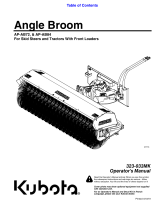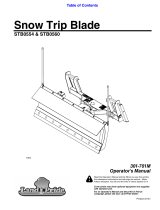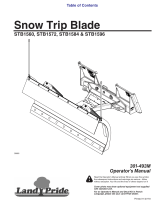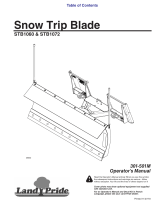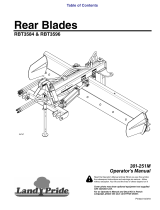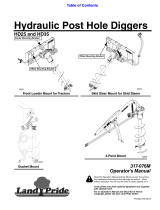Page is loading ...

109341_EN 01088950 R-20180724
READ & FOLLOW ALL SAFETY & INSTRUCTIONS BEFORE
OPERTING YOUR EQUIPEMENT
#700944
Snow/Utility blade 62''
#7008121
Snow/Utility blade 72''
#700936
Angling push frame for blade
*ASSEMBLY *REPAIR PARTS
*OPERATION *MAINTENANCE

Table of content
Table of content
Introduction ...................................................................... 1
Important safety information ........................................... 2
Safety alert symbol/Signal words/Safety messages ..... 2
Safety Decals ................................................................ 5
Assembly & initial set-up .................................................. 6
Vehicle requirements ................................................... 6
Reception ..................................................................... 7
Assembly general instructions ..................................... 7
Accessory Assembly ..................................................... 8
Assembly of the angling push frame #700936 ......... 8
Options Assembly ....................................................... 10
Edge marker kit (#700665) ..................................... 10
Rubber deflector (#700664) ................................... 10
Side Blade kit (#700663) ........................................ 10
Bladeextensionkit12”(#700662) ......................... 10
Initial set-up................................................................ 10
Accessory Hook-up & Unhook ........................................ 11
Skid steer quick attach Style .................................. 11
Operating instructions .................................................... 13
Safety Precautions ...................................................... 13
Controls and display ................................................... 13
Operating instructions ................................................ 14
Pre-start instructions ............................................. 14
Vehicle shutdown procedures ............................... 14
Hooking-Up the accessory ..................................... 14
Unhooking the accessory ....................................... 14
Operation of the snow blade on loader ................. 14
Adjustments .................................................................... 15
Blade Angling .............................................................. 15
Manual angling ...................................................... 15
Hydraulic angling (If applicable) ............................. 15
Blade skid shoe ........................................................... 16
Maintenance & Lubrication ............................................ 17
Maintenance schedules .............................................. 17
Maintenance procedures ........................................... 17
Steel cutting edge .................................................. 17
Troubleshooting .............................................................. 18
Storage and transportation ............................................ 19
Long-Term Storage ..................................................... 19
Transportation ............................................................ 19
Specifications .................................................................. 20
Part list and parts breakdown ......................................... 21
Main accessories ........................................................ 21
Torque specification table .............................................. 29
Warranty ......................................................................... 30

Introduction
1
Introduction
To the purchaser
This new accessory was carefully designed to give years of dependable service. This manual has been provided to
assist in the safe operation and servicing of your attachment.
All photographs
, illustrations and information in the manual m
ay not necessarily depict the actual models or
attachments
, but are intended for reference only and are based on the latest product information available at the time of
publication.
Familiarize yourself fully with the safety recommendations, assembly, operating procedures, adjustments,
troubleshooting,andmaintenancebeforeputtingthemachinetouse.It’sanecessityforalloperatorstocarefullyread,
understand and follow these recommendations and insist that they be followed by those who will use this attachment.
This manual should be kept for future reference.
Please check if you have received all the parts for your kit with the list of the bag and the list of the box.
Serial number
If applicable, record the serial number and purchase date of your attachment in the section reserved below. Your dealer
will require
this information to give you prompt, efficient service when ordering replacement parts. Use only genuine
parts when replacements are required.
If applicable, the location of the serial numbe
r on the accessory is shown in the parts breakdown & part list section of
this manual.
SERIAL NUMBER ___________________________ MODEL NUMBER _____________________
PURCHASE DATE __________________________
If warranty repairs are required please present this registration booklet and original sales invoice to your selling dealer
for warranty service.
Terminology
“Accessory”isusedasageneralwordtodescribetheaccessorydescribedinthismanual
The“right”and“left”sideisdeterminedby sitting in thedriver’sseatfacingforward.
“Vehicle”isageneraltermtodescribeonwhatvehicle(tractor,atv,utv,gardentractor,…)theaccessoryis
installed
Further Assistance
If you need any assistance in understanding the information given in the manual and other concerns regarding
operation of the machine or for repair parts, safetydecals,…
1. Ask your dealership service
2. If you are not satisfied seek for general manager of dealership or service manager
3. If you still not satisfied, contact us at the address specified on the back page of this manual
Application
The Snow blade is designed to push snow straight ahead or angled to clear driveway or parking lot from snow in winter
time

Important safety information
2
Important safety information
Safety alert symbol/Signal words/Safety messages
These are common practices that may or may not be applicable to the product described in this manual.
SAFETY ALERT SYMBOL
THIS SAFETY ALERT SYMBOL IDENTIFIES AN IMPORTANT SAFETY MESSAGE IN THIS
MANUAL THAT HELPS YOU AND OTHERS AVOID PERSONAL INJURY OR EVEN DEATH.
DANGER, WARNING, AND CAUTION ARE SIGNAL WORDS USED TO IDENTIFY THE LEVEL OF
HAZARD. HOWEVER, REGARDLESS OF THE HAZARD, BE EXTREMELY CAREFUL.
DANGER: Signals an extreme hazard that will cause serious injury or death if recommended precautions
are not followed.
WARNING: Signals a hazard that may cause serious injury or death if the recommended precautions are not
followed.
CAUTION: Signals a hazard that may cause minor or moderate injury if the recommended precautions are
not followed.
PREPARATION FOR USE
All operators, no matter how experienced they may
be, should read and understand this and other
manuals related to the vehicle and accessory before
operating. It is the owner's legal obligation to instruct all
operators in safe operation of the accessory to prevent
injury or death. Improper use of the accessory can
cause serious injury or death.
Read and understand this owner's manual
carefully. Be thoroughly familiar with the controls
and proper use of the vehicle and accessory.
Know how to stop the unit and handle the
controls quickly in case of emergency
Read andunderstandthe“SafetyDecals”
section, read all instructions noted on them
or/andinthe“SafetyDecals”section
Never allow children to operate the vehicle nor the
accessory. Never allow adults to operate or
maintain the vehicle nor the accessory without
proper instructions. Local regulations restrict the
age of the operator.
Children are often attracted to accessories. Never
assume children will stay in place where you have
last seen them. Keep children under surveillance of
a responsible adult at all times.
No one should operate the vehicle nor the
accessory while intoxicated or while taking
medication that impairs the senses or reactions.
The operator should, if taking
medication
, seek
medical advice on whether he/she can safely
operate the equipment.
Keep the area of operation clear of all people,
particularly small children.
Never start or operate the accessories except
fromtheoperator’sseat.
Prepare for emergencies. Be prepared if a fire
starts. Keep first aid kit and fire extinguisher
handy. Keep emergency phone numbers
(doctor, ambulance, etc) near a phone
Thoroughly inspect the area where the
accessory is to be used and remove door mats,
wires, and other foreign objects
For motorized accessories, disengage all
clutches and shift into neutral before starting
engine.
Do not operate or maintain the accessory without
wearing adequate clothing and safety equipment.
(glasses, muffs, earplugs, mask…)
Wear footwear
that will improve footing on slippery surfaces.
Prolonged exposure to loud noise can cause
hearing impairment or hearing loss.
Clothing should be snug without fringes and pull
strings to avoid entanglement with moving parts.
Avoid wearing radio headphones while operating.

Important safety information
3
Handle fuel with care, it is highly flammable and
vapors are explosive.
a) Extinguish all cigarettes, cigars, pipes and other
sources of ignition.
b) Use approved fuel container.
c) Never add fuel to a running engine or hot
engine.
d) Fill fuel tank outdoors with extreme care. Never
fill fuel tank indoors.
e) Never fill containers inside a vehicle, on a
truck or a trailer bed with a plastic liner.
Always place containers on the ground, away
from your vehicle, before filling.
f) When possible, remove gas-powered
equipment from the truck or trailer and refuel it
on the ground. If this is not possible, then
refuel such equipment on a trailer with a
portable container, rather than directly from a
gasoline dispenser nozzle.
g) Keep the nozzle in contact with the rim of the
fuel tank or container opening at all times, until
refueling is complete. Do not use a nozzle
lock-open device.
h) Never overfill fuel tank. Replace fuel cap
securely and wipe up spilled fuel.
i) If fuel is spilled on clothing, change clothing
immediately.
Never attempt to make any adjustments while
the engine (motor) is running (except when
specifically recommended by manufacturer).
Let the vehicle and accessory adjust to outdoor
temperatures before using.
Always make sure to have safe traction on the
vehicle by using the recommended accessories
(chains,tracks,counterweights…).See
operation section.
Always make sure all components are correctly
installed. (driveline securely attached and locked
atbothends,beltsproperlyinstalled…)
Never modify the accessory or any part without
the written consent from the manufacturer. Use
only options/accessories approved by the
manufacturer
Avoid underground utilities. If the accessory digs
into the ground, always contact your local utility
companies (electrical,water,gas,…)before
digging to know where you can dig.
OPERATION:
Do not put hands or feet near, under or inside
rotating parts or any power driven parts
Exercise extreme caution when operating on or
crossing gravel drives, walks or roads. Stay alert
for hidden hazards such as traffic, fences, trees,
buildings, wires, etc.
After striking a foreign object, stop the engine
(motor), disconnect the wire from the spark
plug(s) and keep wire away to prevent
accidental starting. Thoroughly inspect the
accessory for any damage and repair damage
before restarting and using the accessory.
If the unit should start to vibrate abnormally, stop
the engine (motor) and check immediately for
the cause. Vibration is generally a warning of
trouble. Do not use equipment until properly
repaired.
Take all possible precautions when leaving the
operator’sseat. Disengage the power take-off,
lower the accessory, place the transmission into
neutral, set the parking brake, stop the engine
and remove the ignition key to prevent
unauthorized starting then wait for all
components to come to a complete stop before
leavingoperator’sseat.
Do not run the engine indoors, except when
starting the engine and for transporting in or out
of the building. Do not operate or let motor run in
a storage area without ventilation because gas
contains carbon monoxide which is odorless,
colorless and can cause death.
Never use the accessories across the face of
slopes, go from top to bottom. Exercise extreme
caution when using equipment on slopes, on wet
ground or near a drop-off. Do not attempt to use
accessory on a steep slope.
Never tolerate bystanders in the working zone or
between the vehicle and accessory while
hooking-up the accessory.
Never operate the accessory at high transport
speeds. Move and turn vehicle at low speeds
during operation. Be cautious when backing up.
Do not carry or lift passengers on vehicle or
accessory.
Disengage power to the accessory when it is
transported or not in use.
Never operate the accessory without good
visibility or light.
Keep the accessory away from heat sources or
flames.
Never use accessory if it has been dropped or
damaged. Repair if necessary before re-using.
Never use an accessory without proper guards,
plates, or other safety protective devices in place

Important safety information
4
TRANSPORT
Review Transport Safety instructions in the
vehicle manual before moving or hauling.
Check with local authorities regarding transport
on public roads and off road. Comply to all
applicable laws and regulations.
Make sure all lights and reflectors that are
required by the local highway and transport
authorities (exemple : SMV (Slow Moving
Vehicle), flashing warning light) are in place, are
clean, and can be seen clearly by all overtaking
and oncoming traffic. Turn on flashing warning
light whenever on a highway, except where such
is prohibited by law.
Never have the equipment in operation during
transport.
Always travel at a safe at slow speed to allow
adequate steering control and stopping
Always drive with accessory low to the ground
but high enough to avoid any contact with road
or any foreign objects during transportation
Avoid any contact with any overhead power line.
Never drive the accessories across the face of
slopes, go from top to bottom or bottom to up
Engage parking brake when stopped on an
incline
Allow for the accessory length when making
turns.
MAINTENANCE AND ADJUSTMENT
When cleaning, repairing or inspecting the
vehicle and accessory: park on a solid level
ground (in a clean dry area), disengage drives,
lower implement, set parking brake, stop the
engine, remove ignition key, and wait that all
moving parts have stopped and cooled. For
gasoline engine, disconnect wire from the spark
plug(s) and keep wire away to prevent
accidental starting.
Allow the accessory to cool before working on it
Use a jack and support blocks to support
equipment when required. Carefully release
pressure from equipment with stored energy.
Check all the bolts and components at frequent
intervals to make sure that they are properly
tightened and in safe working condition.
When inflating tires, stand on one side NOT in
front or over the tire assembly. Use a safety
cage if available.
Remove grease, oil, or debris build-ups.
Remove all tools and unused parts from
equipment before operation.
Disconnect battery ground cable (-) before
servicing or adjusting electrical systems or
before welding on implement
Replace parts on this accessory with genuine
part only.
Understands maintenance and adjustment
procedure, see adjustment and maintenance
sectionoftheowner’smanual.
Never work or walk under the accessory unless
securely blocked. Otherwise accessory can fall.
Visually check for hydraulic leaks and broken,
missing, or malfunctioning parts and make
necessary repairs before applying pressure to
the system. Do the same validation after
applying pressure to the system (use a piece of
cardboard not your hands to detect leaks).
Escaping hydraulic oil under pressure can have
sufficient force to penetrate skin, causing serious
personal injury. If injured by escaping fluid,
obtain medical treatment immediately.
Wear protective gloves and safety glasses or
googles when working with hydraulic system.
Before disconnecting hydraulic line or
performing work, relieve all hydraulic pressure
STORAGE
Never store a motorized accessory with fuel in
the fuel tank inside a building where ignition
sources are present such as hot water and
space heaters, clothes dryers, and the like.
Allow the engine to cool before storing in any
enclosure.
Alwaysrefertotheowner’smanualwhenyou
store the accessory and vehicle for a prolonged
or an unspecified length of time.
Maintain or replace safety and instruction labels,
as necessary.
For winter accessories, (if applicable), let the
engine run for a few minutes after clearing snow
in order to prevent the rotary parts from freezing.
Alwaysrefertooperator’smanualforimportant
details if the accessory is to be stored for an
extended period
Store the accessory in an area where children
normally do not play. Secure the implement
using blocks and supports and secure any pointy
or sharp edges.

Important safety information
5
Safety Decals
Readandunderstandallinstructions/explanationsnotedondecalsor/andinthe“SafetyDecals”section
Keep the safety decals clean and visible
For decal location see part list section of this manual
Replace decals if decals are missing or illegible
To buynewdecals,seethe“furtherassistance”sectionintheintroductionsectionofthismanual
To Install new labels
oDeeplycleanareawherethelabelwillbeinstalled(removeanygrease,rust,dust,….)
oApply adhesion promoter PRO-FORM PF946C (follow instruction on product label)
oPeel the decal and install at the proper location (see part list) by pressing on the decal
oRemove any bubbles under the decal
Decals # 108390 #107972

Assembly and initial set-up
6
Assembly & initial set-up
Vehicle requirements
The Snow Push is designed to attach to tractor loader
equippedwithaloaderuniversalquickattachhitch“skid
steer”style.
Horsepower range: 20-40hp
Vehicle type: agricultural tractor with loader
Maximum vehicle weight: 3500lbs
Maximum hydraulic pressure: 3000psi
Loader minimum lift capacity at full height at pivot
pin (C) is 400 pounds.
oMPORTANT,iflengthLislessthan40’’,contactus
for calculation.
To avoid serious injury or death:
Counterweight may be required. Refer to your loader and
tractor manual to determine if counterweight is needed.
If loader and tractor manual do not have enough
information, contact your tractor/loader manufacturer to
determine if you need counterweight
To avoid serious injury or death caused by vehicle
overturn from falling of the vehicle:
Operate only with tractor equipped with an approved
rollover-protective structure (ROPS) or ROPS cab and
seat belt. Foldable ROPS must be kept up at all times.
Fasten seatbelt snugly and securely.

Assembly and initial set-up
7
Reception
CAUTION
To avoid serious injury :
Keep Clear. The accessory can flip forward or backward
suddenly causing serious injury while removing the
accessory from packaging.
A. Remove the snow blade from the cardboard box (A-
B). Also remove cardboard end caps (C).
B. Place the snow blade face down on an even surface.
C. Install the Angling push frame #700936. (see
accessory assembly sub section of the section
assembly & initial setup)
We suggest doing any other assembly after the accessory
has been hooked up to the vehicle and securely
supported with solid support.
Assembly general instructions
Unless otherwise specified, torque all bolts to
“torquespecificationtable”(seetableofcontentfor
page number)
Refer to parts breakdown section for part
identification.

Assembly and initial set-up
8
Accessory Assembly
WARNING
THIS ACCESSORY AND ALL OPTIONS ARE HEAVY!
To avoid risk of strain injury, NEVER lift the accessory or
any options by hand alone when handling the components
or assembly. Use proper lifting device and seek assistance.
When accessory is off the ground, NEVER be underneath
the accessory. Serious injury including possibility of death
could occur if accessory were to drop suddenly.
Always wear protective shoes and appropriate gloves
when manipulating or using this equipment.
CAUTION
To avoid serious injury !
Proceed to the assembly of the accessory or option after
the accessory or option have been securely lifted with a
hoist or other lifting device.
Do not remove lifting device until assembly is complete
to avoid accessory or option falling suddenly
Assembly of the angling push frame
#700936
Remove fabrane, crate top and side and any hardware
securing the push frame in the packaging.
Using a hoist, forklift, or other lifting device, attach lifting
chain around the plate tube of the push frame (item A)
and lift off the ground
Safely move the push frame over the blade and install
it as shown.
A. Slide the springs (A) into the holes (B) as Shown.
B. Move the push frame (item 2) near to the blade
(item1) and secure the springs (A) to the blade
with the clevis shackle (B).

Assembly and initial set-up
9
C. Press the push frame stops (B) onto the blade
seats (C) and rotate to align the blade holes (D)
with those on the push frame.
D. Secure the blade with the push frame with the
M12x1.75x35 bolts (item 1), 9/16 flat washer
(item 2), # 102308 sleeve (item 3) and the
M12x1.75 nylon nuts (item 4). The sleeve (item 3)
is installed inside the hole in the push frame.
E. Repeat this process (step D) on both sides.
F. Fasten the assembly by the same chain as during
assembly (A) and rotate the assembled product
to the floor. Make sure it rests on a flat, stable
surface.

Assembly and initial set-up
10
Options Assembly
To avoid serious injury or death:!
Proceed to the assembly/adjustment on the accessory
after it has been properly attached to the vehicle and
secured with solid support. Never work around
equipment supported by hydraulics. Hydraulics can drop
equipment instantly if controls are actuated or if
hydraulic lines burst even when power to hydraulics is
shut off.
Edge marker kit (#700665)
See kit instruction for instructions
Rubber deflector (#700664)
See kit instruction for instructions
Side Blade kit (#700663)
See kit instruction for instructions
Blade extension kit 12” (#700662)
See kit instruction for instructions
Initial set-up
See adjustment section for complete list of the
adjustments.

Accessory Hook-up & Unhook
11
Accessory Hook-up & Unhook
Skid steer quick attach Style
Hooking-Up the accessory - Skid
steer quick attach style
To avoid serious injury or death :
A Crushing Hazard exists when hooking-up equipment.
Do not allow anyone to stand between vehicle and the
equipment while hooking-up to implement. Do not
operate hydraulic controls while someone is near the
vehicle or implement.
To avoid serious injury or death :
Make sure the skid steer style loader hitch is properly
attached to the quick attach frame. It must be secured
under the top angle bar and locking handles must be
locked down with locking pins extending fully through
the bottom slots. An improperly attached equipment can
come loose and fall.
A. Shutdownvehiclesee“vehicleshutdownprocedure”
in the operation section
B. Make sure all hooking components are clean and no
components will interfere with hitch hook-up. If
needed, pull locking handles up on loader hitch until
locking pins are fully raised.
C. Carefully drive up to the accessory making sure
loader hitch is parallel with the quick attach frame
(item A).
D. Rotate top of loader hitch slightly forward.
E. Place top of loader hitch under the top angled bars
(item B) on the quick attach frame.
F. Slowly lift loader hitch up until hitch and top angle
bars on the equipment have come together.
G. Rotate top of loader hitch back to align bottom slots
(item C) in the quick attach frame with locking pins
on the loader hitch.
H. Shut down vehicle before dismounting to complete
hook-up.Referto“vehicle shutdownprocedure”in
the operation section
I. Push locking handles on loader hitch down until
locking pins fully extend through bottom slots (items
C) in quick attach frame. Make sure locking handles
are locked into position to keep pins from backing
out
J. See hose Hook-up section and electrical Hook-up if
applicable
Note : Accessory has been hidden on the picture above
for comprehension
Check interferences
Repeat the following steps for all possible adjustments of
the accessory (see adjustment section) and all possible
movement of any part of the accessory which affect the
position of any part of the accessory relatively to the
tractor.
A. After doing the adjustment, validate that any part of
the accessory does not contact any part of the
tractor
B. Slowly move the accessory up and down and validate
that any part of the accessory does not come in
contact any part of the tractor

Accessory Hook-up & Unhook
12
Hose Hook-Up
(If applicable)
To avoid serious injury or death:
Escaping hydraulic oil under pressure can have
sufficient force to penetrate skin, causing serious
personal injury. If injured by escaping fluid, obtain
medical treatment immediately.
Wear protective gloves and safety glasses or goggles
when working with hydraulic system.
Before disconnecting hydraulic line or performing
work, relieve all hydraulic pressure
Visually check for hydraulic leaks and broken, missing,
or malfunctioning parts and make necessary repairs
before applying pressure to the system. Do the same
validation after applying pressure to the system (use a
piece of cardboard not your hands to detect leaks).
1.
Route hydraulic hose to the tractor hydraulic quick
connect in a way to avoid damage to hose and allow
movement of any components. Example : avoid any
contact with any sharp edges, hot surfaces, any
moving part of any component of the vehicle that
may damage the hose during installation, operation
or maintenance
2.
Clean quick couplers and connect the quick coupler
to the tractor quick couplers. Make sure this is the
same coupler size and type and fully engaged.
3.
Use the hydraulic control to activate the accessory. If
the movement is the opposite than what expected,
switch hose on the tractor coupler.
4.
Purge the hydraulic system (see purging hydraulic
system section)
Bleeding hydraulic System
(If applicable)
Hydraulic components on the accessory can contain air.
The air needs to be purged from component
1. Raisetheaccessory6’’offtheground
2. Activate the hydraulic control to cycle all possible
movement of the accessory several times until the
movement is stable.
Unhooking the accessory – Skid
steer quick attach style
A. Park vehicle on a solid and flat surface
B. Shut down vehicle (see shutdown vehicle in
operation section)
C. Lock lateral float (see adjustment section)
Place transmission in park, set park brake, shut power
equipment off, and remove switch key to avoid
accidental starting. See“vehicleshutdownprocedures”
in the operation section
Remove from Skid Steer Style Hitch:
A. Remove any electric or hydraulic connections if
applicable
B. Pull lock handles up to remove pins from bottom
slots in hitch plate.
C. Return to vehicle. Start vehicle and tilt top of hitch
plate slightly forward toward the equipment.
D. Slowly lower the equipment until its top angle bar
and loader hitch have separated.
E. Back vehicle slowly away from the equipment while
making sure the loader hitch does not interfere with
the equipment.
F. Shutdown the vehicle See“vehicleshutdown
procedures”intheoperationsection.
G. Check the stability of the accessory to make sure the
unit will not tip easily in any direction (forward,
backward,…).Ifrequired, add support where needed
to make sure the accessory will not overturn
H. Refer to long term storage section if accessory will
be stored for a long period

Operating instructions
13
Operating instructions
Safety Precautions
To avoid serious injury or death :
Always follow all safety precaution in the important
safety information section of this manual.
Follow all instructions and safety precautions in your
vehicle manual and any other related accessory
manual.
Always follow all safety precaution on all safety decals
To avoid being pinned between loader lift arm or 3pts
hitch and vehicle frame, always operate the accessory
while seated in the operator seat with seat belt
fastened
Keep any part of your body inside the operator area
Beforeleavingtheoperator’sseat,lowerattachment
to the ground, set park brake, turn off engine and
remove key
Do not use foot or hand control for handholds or
steps.
Keep foot and hand control clean at all time
Never bypass or modify a safety device
Keep away from electrical power lines
Never allow riders on vehicle or accessory
Operate vehicle only if equipped with ROPS with
seatbelt fasten at all time
Check hitch fit-up frequently. An improper fit-up can
result the accessory detaching from the vehicle
It’stheoperatorresponsibilitytomakesurenobody
is in the working area before performing any work or
any movement with the vehicle and accessory
If applicable stop loader arms gradually when
lowering or lifting
To avoid serious injury or death caused by vehicle
overturn from falling of the vehicle:
Operate only with tractor equipped with an approved
rollover-protective structure (ROPS) or ROPS cab and
seat belt. Foldable ROPS must be kept up at all times.
Fasten seatbelt snugly and securely.
To avoid serious injury:
Use the accessory for the intended purpose only, use
only for plowing snow. If blade tilt is locked, the blade
can be used to move small amount of light aggregate
materials like loose soil. Do not use to move heavy
material, gravel, rock. This is not a dozer blade.
Avoid hitting solid objects with the accessory. Hitting
objects can damage the accessory and vehicle. Also
hitting solid objects can throw the operator forwards
causing severe injury
Controls and display
The accessory is controlled by the loader control on the
vehicle if the accessory is mounted on the loader and the
third function loader valve for the hydraulic angling if
vehicle and snow blade are equipped with.
Follow the instruction in your vehicle/loader manual for
proper control of the accessory.

Operating instructions
14
Operating instructions
Pre-start instructions
Always inspect equipment before using this equipment.
Refertosection“MaintenanceandLubrication”
Vehicle shutdown procedures
Always shut down vehicle before dismounting
1.
If engaged, disengage PTO
2.
Park on level surface, engage park brake, lower
attachment to the ground, turn off engine, and
remove key to prevent unauthorized starting.
3.
Wait for all components to come to a complete stop
before leaving the operator seat.
4.
Use steps, grap-handles, and skid-resistant surfaces
when getting on and off the vehicle
Hooking-Up the accessory
See the Accessory Hook-up and Unhook section of this
manual.
Unhooking the accessory
See the Accessory Hook-up and Unhook section of this
manual
Operation of the snow blade on loader
The accessory is used to clean snow from parking lot,
driveway,…
To clean snow
Prepare the area to identify any potential
obstructions and identify with stakes that can be see
above snow
Make all required adjustment (see adjustment
section)
A. Using the loader tilt control lever, make sure the
push frame (item A) is parallel to ground (item B)
B. Lower the accessory at the desired location and put
the loader valve on float mode
C. Make sure the blade push frame still parallel to the
ground
D. Use the vehicle to go forward to push snow at low
speed. To angle the blade to clean large lots, see the
adjustment section
a. If snow is to thick or wet, remove layer by
layer.Forexample:12’’wetsnow,cleanthe
6’’atthetopthandoanotherpassto
complete the snow removal.

Adjustments
15
Adjustments
Blade Angling
Manual angling
To avoid serious injury:
Do not put finger or any part of the body in turntable
holes. This can shear object and/or part of body
.
There are 5 openings on the snow blade frame for angle
adjustment
Place yourself in front of the blade to adjust the angle to
avoid being pinch by the angulation movement.
A. For angling the blade, pull the latch (A) to release the
angling movement.
B. Rotate the blade at the desired angle
C. Push back the latch (A) in the desired opening to lock
the angulation.
Hydraulic angling (If applicable)
Using the tractor hydraulic control lever, move in one
direction to rotate the blade then stop at the desired
angle. If the direction is the opposite of the desired
movement with the hydraulic lever, switch the hydraulic
vehicle outlet.

Adjustments
16
Blade skid shoe
A. Place support under the cutting edge high enough to
allow the removal of the skid shoe (item 1)
B. Lower the blade until the blade is resting on the
support block
C. Shut down vehicle, see vehicle shutdown procedure
in operation section
D. Remove linch pin (item 3) then adjust height of the
skid shoe by placing shims (2) underneath the blade
to obtain the desired height. Put the remaining
shims over the blade.
Make sure the adjustment is the same for both skid shoe.
We recommend the following adjustment for dimensions
Forsnowwerecommendaround½’’betweenunder
the skid shoe to the cutting edge (A)

Maintenance & Lubrication
17
Maintenance & Lubrication
To avoid serious injury or death :
Always follow all safety precautions in the important
safety information section of this manual.
Follow all instructions and safety precautions in your
vehicle manual and any other related accessory
manual.
Use jack and support blocks to support equipment
when required. Carefully release pressure from
equipment with stored energy.
Replace parts on this accessory with genuine parts
only.
Never work or walk under the accessory unless
securely blocked. Otherwise accessory can fall.
Never allow untrained personnel to service machine.
Maintenance schedules
Before each use shutdown tractor (see shutdown vehicle
in the operation section) before dismounting from
vehicle.
Make sure all bolts are still at proper location and
tight
Visually check for excessive wear and loose parts.
Inspect all connections for leaks
Each 8hour of work.
Inspect the equipment for skid shoe wear
Inspect for cutting edge wear
Maintenance procedures
Steel cutting edge
When the steel cutting edge is worn out.
The cutting edge can be removed and installed upward to
increase lifespan

Troubleshooting
18
Troubleshooting
Problem
Cause
Solution
Blade flips too easily
Trip spring worn out or broken
Change the trip springs
Quick connect does not fit properly
Hydraulic lines are pressurized
Relieve hydraulic pressure
Wrong hydraulic coupler
Replace hydraulic coupler
Hydraulic angling uneven action
Air in the actuators or hoses
Purge the actuators and hoses
/
